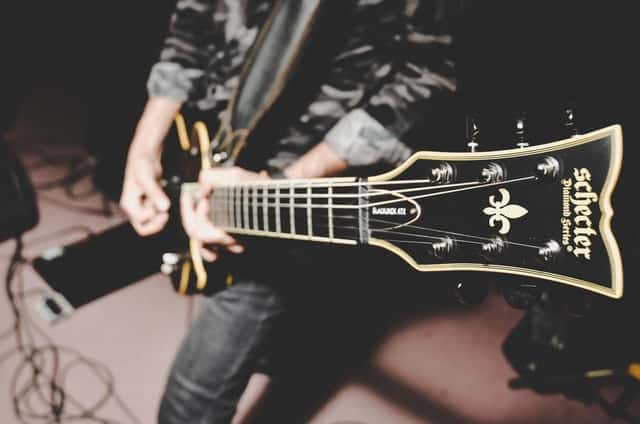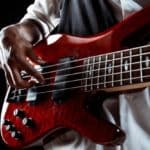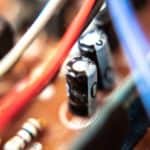I know it because it happened to me:
Back from the store after getting my first electric guitar and amp, I plug everything where it goes, turn it on after setting a moderate volume to not be kicked out of home, and play my first note…
And it sounds like an old boring acoustic guitar?
But weren’t electric guitars meant to sound like they sound in the hands of Metallica, Pantera, or at least Black Sabbath?
Sadly (or thankfully) not necessarily.
You see, a great metal sound is something people spend hours on end crafting and tweaking.
But here are the basics of it:
To achieve a great metal tone with your guitar, first, you should max its volume and tone controls. After that, developing a tight palm muting technique and playing riffs with downstrokes are a must. Finally, avoid setting your amp’s gain to max, give it some air, and experiment with gain stacking.
In this article, I will lay out all you need to know to make your guitar sound metal. From your playing to your guitar, to your amp and pedals.
After leaving this page, I can assure you will clearly know how to set up your rig to start rocking out as your idols do.
Are you ready to get started?
Let’s go!
What defines a good metal sound?
There are many different genres and subgenres of metal, and each has its slight differences and nuances in what respects guitar sound, perhaps the most important instrument within the style.
However, If I were to pinpoint what is the central characteristic all metal guitar tones share is distortion. High-gain distortion.
But it’s not a matter of just cranking the gain knob on your amp or effects processor and calling it a day.
At least not if you are looking for a great tone.
You see, if you dig deeper into the most iconic tones from the genre, you will notice that it’s not gain set at max what shapes the sound.
Actually, amp gain, although usually high is rarely maxed, and even set up at a lower value as novice players would imagine.
A lot of the modern metal sound comes from what’s called gain stacking, a practice that just means using different gain sources one in front of the other.
One of the most common gain stacking setups among metalheads is just running a Tubescreamer in a neutral setting before the driven amp, just to give it an extra oomph.
Can any guitar sound metal?
Although there are many different opinions on this matter, I would argue that just about any guitar could sound metal.
But the funny question to ask is if they SHOULD be used for metal.
For instance, I know that with a proper rig I could get some chugging rhythm tones out of my semi-hollow Gretsch.
But would that be advisable?
Semi-hollow and hollow guitars don’t work that great with heavy distortion since they are very prone to feedback, and it will probably all end with a noisy mess.
On the other hand, my favorite vintage spec’d Strat would be another instrument regularly not recommended for metal, however, I know I could get some killer lead tones out of it.
The thing is, probably its bridge single-coil pickup won’t be the best choice for playing rhythm, since it’s too bright and has a rather low output compared to more conventional “metal” pickups.
What I’m trying to say here is that if you take the time to figure things out, and can cope with some particular issues, just about any guitar could sound metal.
Despite this, there are a lot of guitar models dedicated exclusively to the metal genre at all price points, that would help you achieve “truer” metal tones way easily.
What’s more important for metal, your guitar, or your amp?
For getting a great distorted tone for metal, the most important thing is having a good amp with a great lead channel.
However, if your budget restricts it (because all of the greatest metal amps are tube amps which are on the expensive side of the equation) a digital amp such as the Boss Katana, or a multi-effects pedalboard will get you pretty close.
The guitar, in my opinion, comes last in this equation, because as I mentioned earlier, I’m pretty sure that with the right equipment you could get a decent metal tone out of about any model.
Of course, as your budget allows it in the future, having a coherent rig intended for metal from guitar to pedals to the amp is the recommended choice.
How to make your guitar sound metal?
The first step for getting a great metal sound with your guitar is making sure you have your pickup volumes set at max and your tone controls rolled completely to the brighter side (the opposite of the muffled dark sound you can get by rolling it the other way).
Great metal sounds are aggressive, and we need all of the above as a prerequisite for achieving the needed attack when you hit the notes.
Now, a lot of metal playing depends on technique, and at a very basic level, you should at least learn how to palm mute the lower strings.
Also, power chords and playing riffs with only downstrokes are a primary feature of the genre.
Amp settings for metal
Now, focusing on the amp, the first thing is to set up your gain at a decent level. Not max, but surely not below the 12 O’clock position for the knob.
From there you should start experimenting going back and forward.
As for the EQ (lows, highs, and mids) of the amp, sadly there is not an actual setting set in stone that will magically make you sound like James Hetfield.
I would recommend you try starting with a scooped V EQ. This is achieved by rolling down the mids, probably not to zero, but to a lower setting than the lows and highs.
Now, with your low and high knobs set at noon, you could start rolling in and out the lows while palm muting and plucking the low E string.
At this point focus on how bassy your guitar sounds. Does it have enough body? Be careful to not give it too much bass since things might get a bit muddy down there.
Now, for the high-end, each player tends to have their own preferences, from screeching bright tones, to darker ones.
I recommend you try it both ways in small steps, probably shifting from palm muting to some higher power chords or even some riffs until you get it.
Finally, how you hear your rig will probably vary from day to day, and even from song to song, you might feel you need to proceed with some small tweaks. That’s normal.
Tone is a never-ending quest.

Hello there, my name is Ramiro and I’ve been playing guitar for almost 20 years. I’m obsessed with everything gear-related and I thought it might be worth sharing it. From guitars, pedals, amps, and synths to studio gear and production tips, I hope you find what I post here useful, and I’ll try my best to keep it entertaining also.





